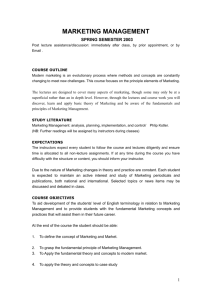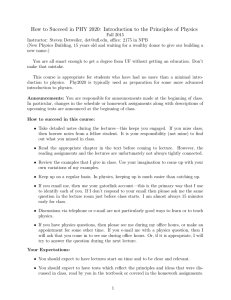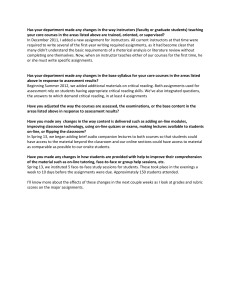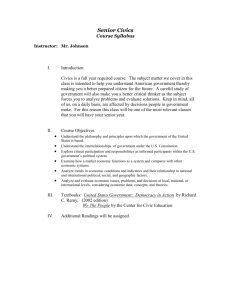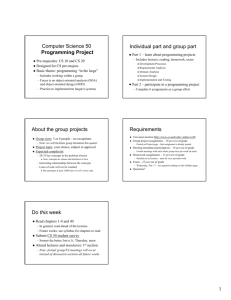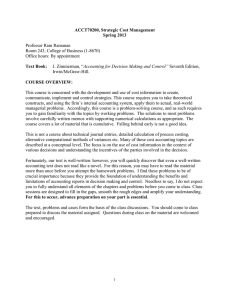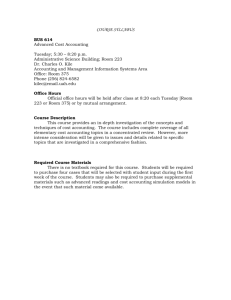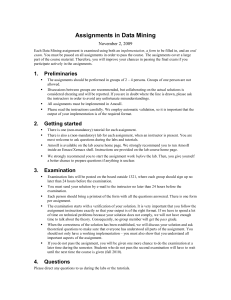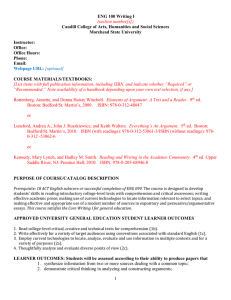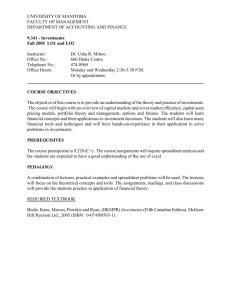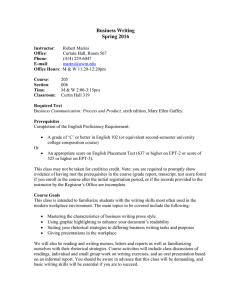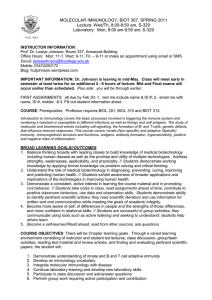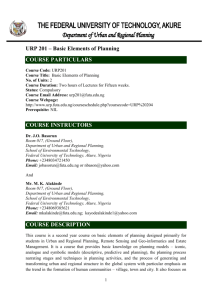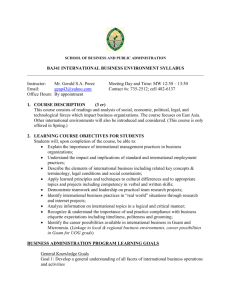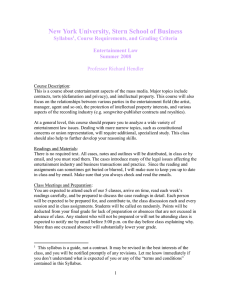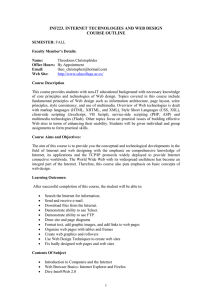CVE 501 – Engineering Economics COURSE PARTICULARS
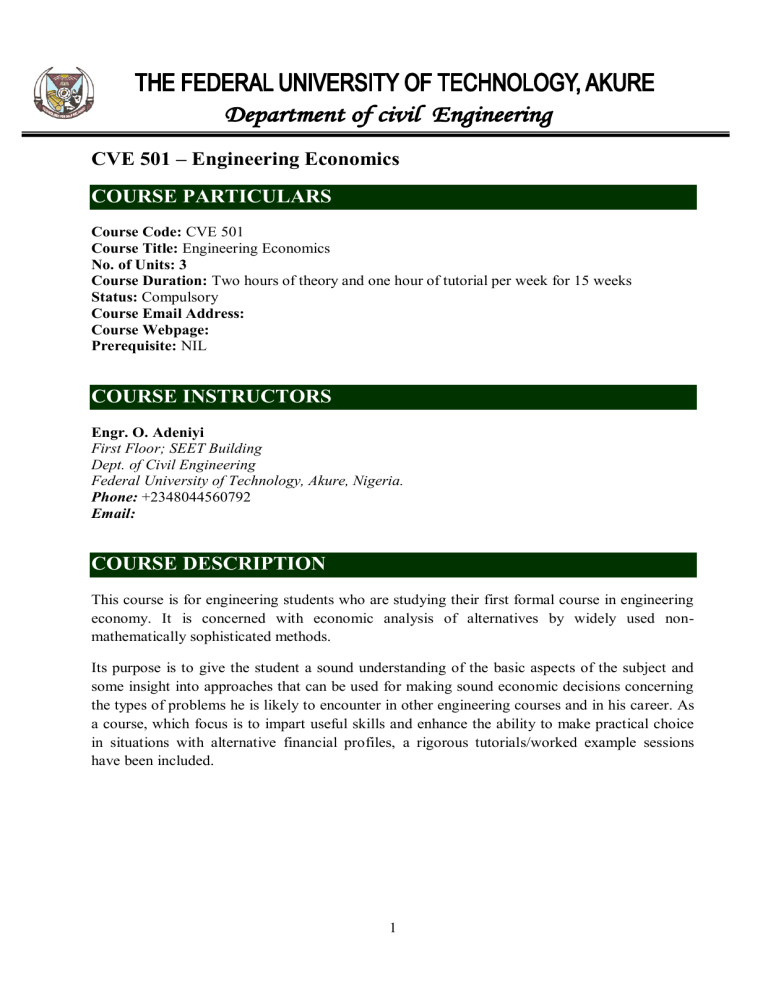
CVE 501 – Engineering Economics
COURSE PARTICULARS
Course Code: CVE 501
Course Title: Engineering Economics
No. of Units: 3
Course Duration: Two hours of theory and one hour of tutorial per week for 15 weeks
Status: Compulsory
Course Email Address:
Course Webpage:
Prerequisite: NIL
COURSE INSTRUCTORS
Engr. O. Adeniyi
First Floor; SEET Building
Dept. of Civil Engineering
Federal University of Technology, Akure, Nigeria.
Phone: +2348044560792
Email:
COURSE DESCRIPTION
This course is for engineering students who are studying their first formal course in engineering economy. It is concerned with economic analysis of alternatives by widely used nonmathematically sophisticated methods.
Its purpose is to give the student a sound understanding of the basic aspects of the subject and some insight into approaches that can be used for making sound economic decisions concerning the types of problems he is likely to encounter in other engineering courses and in his career. As a course, which focus is to impart useful skills and enhance the ability to make practical choice in situations with alternative financial profiles, a rigorous tutorials/worked example sessions have been included.
1
COURSE OBJECTIVES
The objectives of this course are to:
foster the environment whereby students are with cognate theories of the particular subdiscipline as well as adequate practical background to be of immediate valued to industry and the nation in general.
COURSE LEARNING OUTCOMES / COMPETENCIES
Upon successful completion of this course, the student will be able to:
explain varieties of alternative business situations ranging from small to large organisation and furthermore the differences as to the phase of technology in use. appreciate different nature of costs incurrence as in outlay of cashflow in one or another nature of investment and also different industrial. understanding variety of approaches to issues in industry like proper appreciation of the nature of depreciation, risks, uncertainty etc and how each affect investment decision making know more than the above, all which will enable the student acquire a solid base for further study after graduation. This will permit him to understand and use more advanced, and a constant development that open him to procedures needed or adjudged helpful in analysing the more complex economic problems that he may encounter in his later career.
GRADING SYSTEM FOR THE COURSE
This course will be graded as follows:
Class Attendance 5%
Assignments
Test(s)
10%
25%
Final Examination 60%
TOTAL 100%
2
GENERAL INSTRUCTIONS
Attendance: It is expected that every student will be in class for lectures and also participate in all practical exercises. Attendance records will be kept and used to determine each person’s qualification to sit for the final examination. In case of illness or other unavoidable cause of absence, the student must communicate as soon as possible with any of the instructors, indicating the reason for the absence.
Academic Integrity: Violations of academic integrity, including dishonesty in assignments, examinations, or other academic performances are prohibited. You are not allowed to make copies of another person’s work and submit it as your own; that is plagiarism. All cases of academic dishonesty will be reported to the University Management for appropriate sanctions in accordance with the guidelines for handling students’ misconduct as spelt out in the Students’
Handbook.
Assignments and Group Work: Students are expected to submit assignments as scheduled.
Failure to submit an assignment as at when due will earn you zero for that assignment. Only under extenuating circumstances, for which a student has notified any of the instructors in advance, will late submission of assignments be permitted.
Code of Conduct in Lecture Rooms and Laboratories: Students should turn off their cell phones during lectures. Students are prohibited from engaging in other activities (such as texting, watching videos, etc .) during lectures. Food and drinks are not permitted in the laboratories.
READING LIST
E. Paul DeGarmo and John R. Canada. Engineering Economy, 5 th
Edition, Macmillan Publishing Co.
Inc., New York, USA, 573p.
Eugene L. Grant and W. Grant Ireson. principles of Engineering Economy, 4 th
Edition, The Ronald
Press Company, New York, 574p.
3
COURSE OUTLINE
Week
1
Topic
Economics of business setting, costing of production systems.
Alternative locations for manufacturing plants, warehouse, retail stores etc and the contrasting differences in construction costs, taxes, insurance rates and operating costs
Objective of cost analysis and control 2
3
4
Source of Finance, Money and Credit for Projects.
Bank deposits\
corporate and foreign bonds
treasury securities
mortgages
Investment Appraisal
Assigning financial feasibility
difference in result of various methods
Resources allocation 5
6 Interest rates. interest formulas and problems
interest and Money-Time relationships
uniform series and uniform (Arithmetic) gradient series.
normal and effect interest rates.
7. Annual costs. Present worth, rates of return.
perpetuities and capitalized cost.
8 Cost reducing
9 Depreciation Accounting valuation of assets
10-11 Financial Management accounting methods; financial statement, element of costing
12 Budget and Budgeting control
annual accounts
cost control
13 Dwelling with multiple alternatives and uncertainties.
Planning and decision making procedure
14-15 Macroeconomics, Economic growth, National income.
15 Revision
Remarks
The student should be able to distinguish between short term and long term loan and the use of each and the risks
MID-SEMESTER TEST
This is the week preceding the final examination. At this time, evaluation will be done to assess how far the students’ expectations for the course have been met.
4
